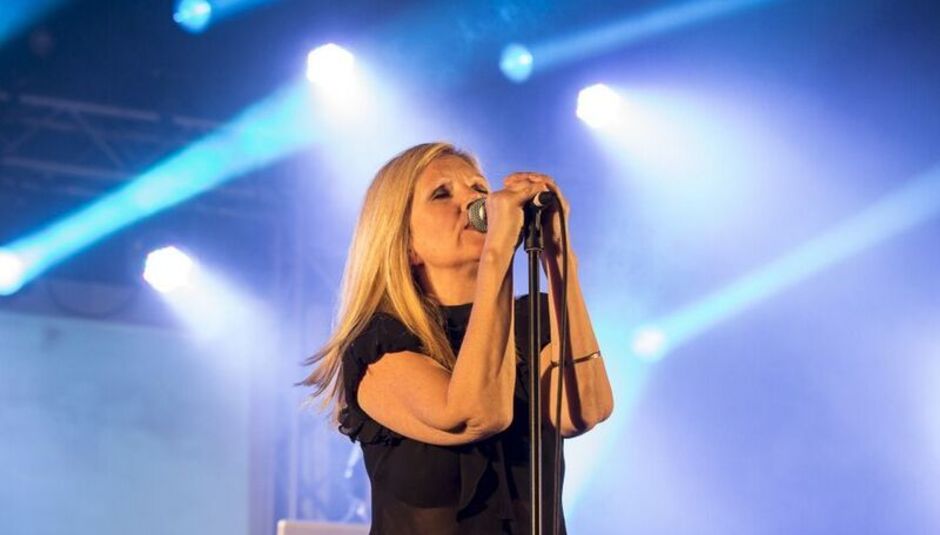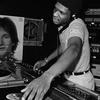Having been formed twenty-six years ago by then music journalists Bob Stanley and Pete Wiggs, Saint Etienne have since gone on to become something of a national institution. Debut 45 'Only Love Can Break Your Heart' - still arguably the greatest cover version on record - came out in the autumn of 1990, and since then they've released over thirty singles and eight albums, with a new one due in the early part of 2017. Vocalist Sarah Cracknell joined the band for third single 'Nothing Can Stop Us' in May 1991, and has remained an integral part of the line-up ever since.
Last weekend saw them headline Indietracks at the Midland Railway museum in Derbyshire, and DiS caught up with the trio prior to their show-stealing set on the main stage.
It's your first time at Indietracks. Did you know much about the festival before you were booked to play?
Sarah Cracknell: I'd heard of it. I didn't realise how amazing it would be with all the trains. I knew trains were involved but I didn't realise some of the artists were actually booked to play on them. It's fantastic. Some friends of ours come here every year.
What are your first impressions of the festival?
SC: It's utterly beautiful. I love it.
Bob Stanley: It's in such a beautiful part of the country.
SC: It reminds me of Beaconsfield model village only in real size. And it also has that community spirit going on too.
Pete Wiggs: We did the Moseley Folk Festival last year and that was quite similar too.
With such an extensive back catalogue to choose from, is it difficult putting together a festival setlist?
SC: We've done a few festivals recently. We tend to try and play at least one song off each album as much as we can. We don't always succeed.
PW: We often forget at least one album every time!
BS: We tend to go hard and in your face!
PW: We are playing Foxbase Alpha in full at a festival later this year. Rockaway Beach.
BS: They requested it.
SC: We tend to choose the more uptempo songs for festivals.
BS: Also, it depends on which festivals we're playing. At some, people just want to hear the hits, whereas at others they want to hear us dip into the albums or more obscure tracks.
Saint Etienne have been around for twenty-six years now. What's the secret behind your longevity?
SC: We've never fallen out. We get on really well and try and enjoy every part of being in a band. Whether it's travelling, playing gigs, or being in the studio. We try and make it as enjoyable as possible. We have a laugh.
BS: We've never overdone it. We got close to overdoing it in 1994 and then we realised we had to pace ourselves!
PW: And even then by most bands standards it was nothing. We went from playing four gigs in four nights to four gigs in a year.
SC: I remember us going to America for two weeks and it nearly killed us.
Was there ever a point where you thought about quitting music and doing something else?
SC: No, not really. Aside from the other reasons I was saying earlier, I don't think we've ever run out of ideas either. What happens if we don't record for a while is, we all start to get twitchy around the same time. So that tends to spur us into going to the studio and being creative. Things just seem to happen.
BS: Time soon flies. It's been four years since our last record.
Are there any plans for a new album?
SC: We've started working on a new record.
BS: We're playing a new song in the set today.
When are you looking to release it?
BS: Hopefully next year. It has to be really. The plan is to get the record finished by November and released in the spring of 2017. We definitely want to get it out before the summer.
Do you prefer working to a set deadline or are you quite flexible around timescales?
SC: It's always better isn't it? I can't achieve anything without a deadline.
When you released your debut single 'Only Love Can Break Your Heart' in September 1990 did you think you'd be talking about making new albums in 2016?
BS: No! We didn't think we'd be around six months later never mind twenty-six years.
SC: It's the maddest thing.
BS: We never expected to be around that long. 'Only Love Can Break Your Heart' was originally a one-off single. After we released 'Kiss And Make Up', I remember Jeff Barrett from Heavenly asking us if we'd started working on an album yet. We hadn't even thought about an album at that point!
What made you choose to cover The Field Mice's 'Let's Kiss And Make Up' for your second single?
PW: They were good friends of ours, Michael Hiscock the bass player in particular. It was the first track on their first album Snowball and we always talked about doing something with it, and it was Michael that persuaded us in the end.
BS: We made it a little bit dancier I suppose. Actually, it's the first thing we ever recorded and that version is coming out as a bonus seven-inch with our anniversary box set.
The first two singles featured guest vocalists before Sarah joined. Was it always your intention to have a permanent vocalist in the band?
BS: We hadn't met Sarah when we did the first two singles, and I guess we looked at the way Soul II Soul worked using different vocalists on most of their tracks.
PW: Also, I think the vocalists on the first two singles suited the different niches.
BS: Once we'd worked with Sarah on 'Nothing Can Stop Us' we knew she'd be perfect for the band.
SC: Minus the logistical nightmare!
While having a dance element to it, your music has transcended many genres and your fanbase covers pretty much every part of the musical spectrum. Was that something you deliberately set out to do?
BS: Not really, but I think it's definitely one of the reasons we're still here today.
Did you see yourselves as being part of any scene when the band first started?
PW: We felt like kindred spirits with a few bands, although they might not necessarily have agreed. People like Massive Attack and the Pet Shop Boys. Stereolab too.
BS: Pulp as well. It was a really weird period before Britpop. There were a lot of groups around with strong identities but at the same time, we also felt like outsiders. We all knew each other and did gigs together. But then Britpop came along and ruined everything.
I remember reading Bob's pieces in the NME and Melody Maker as a teenager, and as a result one of the first bands I got into were the Manic Street Preachers, whose 'Feminine Is Beautiful' single you put out on your Caff label. Did you expect them to become such an iconic band back then?
BS: I think a lot of that was pure luck on my part. I gave a copy to Jeff (Barrett) at Heavenly and he signed them straight away. They were right for that label at the time. We were all like big kids comparing our record collections and even though most of the bands on the label had little in common musically, it felt like a disparate community coming together. There was an indie mentality but mixed in with dance music. We all used to share each other's music and spend hours talking about it, and the Manics were like that too. I've still got connections with most of those people twenty-five years on. Some of them I haven't seen for years but whenever we do meet up we'll spend hours talking about music. The other good thing about the Manics - especially for someone younger - is they're a perfect entry point to so much music. They were always really open about what influenced them and talked about politics and literature which no other bands did at the time. I remember being obsessed with Julian Cope as a teenager and he introduced me to things like psychedelia and Mott The Hoople. At the time no one ever talked about these, and I think that's how the Manics were with their generation. We always thought it important to share compilations and ideas. We've never hidden what our influences are which is something else we have in common with the Manics.
Caff Records only put out seventeen releases and existed for three years, yet it's now heralded as one of the most important - legendary even - DIY labels. Did you foresee that happening at the time?
BS: No, not at all! I'm not sure I'd use the term legendary but it's nice to get some recognition. I started the label when I was on the dole under this thing called the Enterprise Allowance Scheme.
SC: It was an amazing label for discovering bands.
Do you prefer playing live or working in the studio?
SC: They're two completely different things so quite difficult to compare.
PW: They're both exciting in their own way. I guess it can be quite frustrating in the studio when you're trying to do something and it's not happening. But then when it finally does it's the best feeling in the world. There's more chance of having a laugh when you're playing live I guess.
Has your approach to writing and recording changed much over the years?
SC: Not really. We all tend to come together with a bunch of ideas from the start, then just filter everything through gradually. Once we start collaborating those ideas songs tend to form.
Whereabouts are you all based nowadays?
PW: I'm in Brighton.
SC: I live in Oxfordshire.
BS: And I'm based in London. We all used to live in London. We shared a flat together for years.
SC: Not me! Just Bob and Pete.
BS: Even now, Sarah and Pete are only an hour away from London.
SC: It still works alright.
What advice would you give to new bands that are just starting out?
SC: Stick to what organically feels right for you. Don't get swayed into any kind of scene because eventually, people will come around to what you like.
The internet now plays a massive part in helping bands reach a wider audience with their music. Do you think the advance in technology has changed music for the better?
PW: It's good that artists now have a direct medium straight to the listener without having to go through all the industry rigmarole.
BS: The sad thing is that there's no real connection between the artist and the audience anymore. A lot of music I discover nowadays is purely by chance. Whereas when I was younger it was a shared experience. There were lots of great music shows on TV and you'd talk about them with your friends the next day.
Do you think the internet has made music journalism redundant compared to how it used to be?
BS: The standard of writing hasn't deteriorated. If anything it's gone up. It's a bit of a myth that music journalism was better pre-internet. Everyone tends to remember the good bits but if you look back through some of those old copies of the NME and Melody Maker you'll find some dreadful writing. I went to this conference last year and one of the panels was hosted by Paul Morley called 'The Death Of Music Journalism' yet, for all the rhetoric about it being better back then, a lot of it really wasn't. There was some really awful writing that should never have been published. I can't believe some of them ever got any work at all.
Was it difficult to get into back then?
BS: It was. A closed shop almost. I sent a copy of my fanzine to James Brown who was the NME live editor at the time. I was living in Peterborough back then. Anyway, he liked the fanzine and asked me to review Johnny Cash, and that was it.
Are there any new bands you'd recommend Drowned In Sound and its readers should check out?
SC: They're not strictly new but I really like Stealing Sheep; their new record is great. They're supporting us at the two London gigs. I'm a big fan of Warm Digits too.
BS: Galaxians from Leeds are great. Electronic duos are the way forward!
For more information on Saint Etienne including future releases and tours, visit their official website.
Photo by Stephanie Webb






















